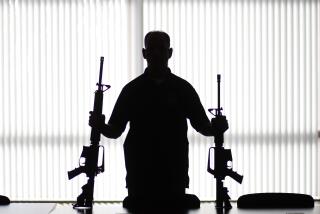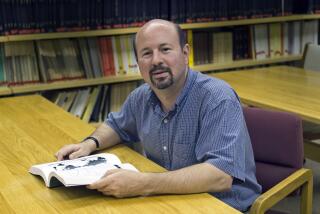Shooting holes in a lawsuit
COULD IT BE that more guns cause less crime? Could it be that criminals who suspect their potential victims are armed would be deterred from committing crimes? That’s what John R. Lott Jr. argued in his 1998 book, “More Guns, Less Crime.”
But could it be that Lott is wrong; that other researchers have been unable to confirm his thesis? That’s what Steven D. Levitt and Stephen J. Dubner argued in their bestselling 2005 book, “Freakonomics.” How should this debate be resolved? Lott’s solution is to try to get the U.S. District Court in Chicago to issue an injunction blocking the sale of “Freakonomics.” That’s a terrible way to deal with controversial research about a crucial public policy issue. Instead of trying to silence his critics, Lott ought to respond to their criticisms.
For the record:
12:00 a.m. Aug. 4, 2006 For The Record
Los Angeles Times Friday August 04, 2006 Home Edition California Part B Page 11 Editorial Pages Desk 1 inches; 61 words Type of Material: Correction
Lawsuit: A May 31 Op-Ed article about a lawsuit brought by scholar John Lott against the authors of “Freakonomics” said that, according to Lott, no one had ever tried to “replicate” the results of his studies on guns and crime. According to Lott, others have tried to replicate his results, and they have come to the same conclusions that he did.
Lott contended in his book that crime was reduced by so-called right-to-carry laws in 35 states allowing people to carry concealed weapons. His supporting research is considered only briefly in “Freakonomics,” which has sold more than 1 million copies and has remained a bestseller for more than 56 weeks. Instead, Levitt and Dubner briefly mention the “troubling allegation” that Lott “invented some of the survey data” in “More Guns, Less Crime” and then go on to discuss more broadly that Lott’s overall argument is apparently wrong.
“Regardless of whether the data were faked,” they say, “Lott’s admittedly intriguing hypothesis doesn’t seem to be true. When other scholars have tried to replicate his results, they found that right-to-carry laws simply don’t bring down crime.”
That last sentence, Lott says in his lawsuit, is false and has “seriously damaged” his reputation. Therefore, he argues, the sale of the book should be stopped until the offending sentence has been removed. Yet many other scholars have criticized Lott in stronger terms without triggering a lawsuit.
If you Google “John Lott” and “research fraud,” you get nearly 150 results, starting off with a 2003 article published in Science magazine by Donald Kennedy, the editor in chief, which criticizes Lott’s “cooked data.” You get an article by Yale Law School professors Ian Ayres and John Donohue, published in the Stanford Law and Economics Working Paper series, who have run the numbers. “In most states,” they wrote in 2002, right-to-carry laws “have been associated with more crime,” not less. Most important, you get the exhaustive 2004 report from the prestigious National Research Council, which found “no credible evidence” supporting Lott’s thesis -- pretty much what “Freakonomics” said.
But Lott and his supporters disagree. They say it’s not true that other researchers have been unable to validate his results. They point to a 2001 issue of the Journal of Law and Economics that contains several articles by scholars who agree with Lott.
But it turns out that all the papers in that issue were originally presented at a conference organized by Lott, according to the Chronicle of Higher Education. The Chronicle reported that Lott not only “arranged for the papers to be published in a special edition” of the journal, which is not unusual, but he also paid for the printing and postage.
Levitt complained in an e-mail to a colleague that “for $15,000 he was able to buy an issue and put in only work that supported him.” (Lott’s lawsuit also targets that e-mail as false and defamatory -- yes, you can be sued for a statement made in an e-mail to a single person.)
The charges that some of Lott’s research was “faked” or “cooked” refer to the first statistic cited in “More Guns, Less Crime,” in which Lott says “98% of the time that people use guns defensively, they merely have to brandish a weapon to break off an attack.” In Op-Ed articles in the Chicago Tribune and elsewhere, he said the source of the 98% figure was “polls by the Los Angeles Times” and other organizations.
When critics noted that no such polls existed, Lott changed his story, and the second edition of “More Guns, Less Crime” gave a new source for the 98% figure: “a national survey I conducted.” But when critics asked to see the data, Lott told the Washington Post and others that he had lost it all in a computer crash.
Scholars, including James Lindgren, professor of law at Northwestern University, asked Lott for other evidence that he had conducted his own survey: names of employees who made the calls, phone records, tally sheets, pay stubs. Lott replied that he had nothing, according to Lindgren.
But Lott is not suing those who have said some of his pro-gun research was “invented,” “faked” or “cooked.” The lawsuit turns on the definition of “replicate,” from the “Freakonomics” sentence about how other scholars have tried and failed to “replicate his results.” Lott maintains “replicate” means “analyze the identical data in the way Lott did.” Because nobody tried to do that, he argues, “Freakonomics” is wrong. Most people, however, understand “replicate” to mean something like “confirm.”
Lott’s reputation has indeed been “seriously damaged” by critics, but only because they have described many apparent holes in his dubious research and misleading citations. Blocking the sale of a book based on a literal interpretation of a single word would be outrageous.
The U.S. District Court should throw this case out promptly.
More to Read
Sign up for our Book Club newsletter
Get the latest news, events and more from the Los Angeles Times Book Club, and help us get L.A. reading and talking.
You may occasionally receive promotional content from the Los Angeles Times.








